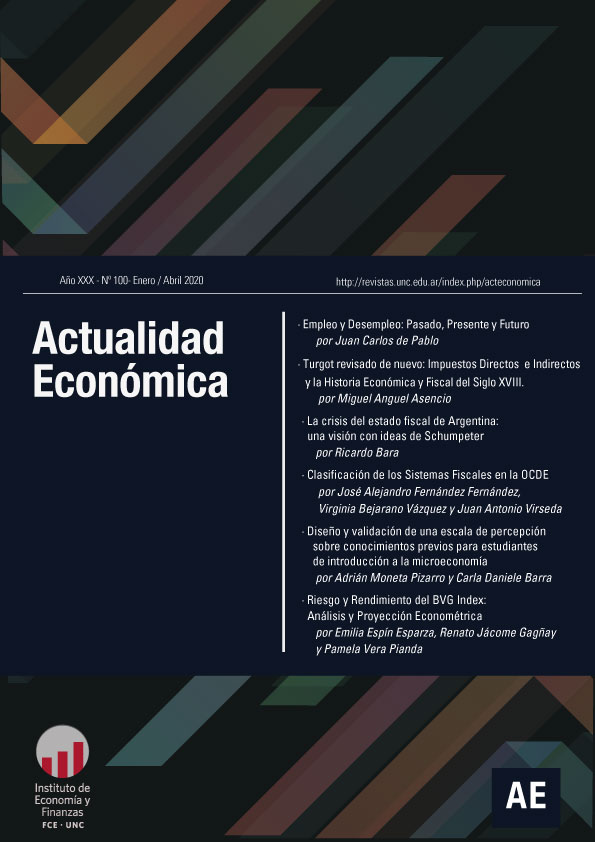The crisis of Argentina's fiscal state: a vision with ideas from Schumpeter
Keywords:
Fiscal State, Schumpeter, Crisis, ArgentinaAbstract
Joseph Schumpeter wrote, in 1918, a famous article: The Fiscal State Crisis. At that time, Austria faced a major fiscal problem because it had to face the accumulated debt after four years of war by the Austro-Hungarian Empire. To find a solution to the problem, he developed a theoretical and historical scheme of the relations between public finances and the economic-political system. This scheme became a classic in the literature on fiscal crises. Our article tries to use Schumpeter's ideas to understand the unsatisfactory behavior of Argentine public finances in the last seventy-five years; and also apply Schumpeter's ideas to our current fiscal situation.
Downloads
References
Boss, A., (1999). “Do We Need Tax Harmonization in the EU?”. Kiel Institute of World Economics, Kiel Working Paper (916).
Cantemir, D., (2013). “Tax Competition - Economic and Financial Policy Instruments”. Knowledge Horizons - Economics, 5(3), 90–93.
Devereux, M., y Loretz, S., (2013). “What do we know about corporate tax competition?” National Tax Journal, 3(66), 745–774.
Devereux, M., Lockwood, B., y Redoano, M., (2007). “Horizontal and vertical indirect tax competition: Theory and some evidence from the USA”. Journal of Public Economics (91), 451–479.
Dima, B., Dima, M., y Barna, F., (2014). “The signaling effect of tax rates under fiscal competition: A (Shannonian) transfer entropy approach”. Economic Modelling (42), 373–381.
Dzialo, J., (2015). “Tax Competition or Tax Coordination? What Is Better for the European Union?” Comparative Economic Research, 18(2), 37-55.
Eggert, W., y Genser, B., (2001). “Is Tax Harmonization Useful?” International Tax and Public Finance, 8(4), 511-527.
Eichner, T., (2014). “Endogenizing leadership and tax competition: Externalities and public”. Regional Science and Urban Economics (46), 18-26.
Epstein, B., Mukherjeeb, R., y Ramnathc, S. (2014). “Taxes and international risk sharing”. Journal of International Economics (102), 310–326.
Feld, L., y Reulier, E. (2005). “Strategic Tax Competition in Switzerland: Evidence from Panel of the Swiss Cantons”. Center for Research in Economics, Management and the Arts. Working Paper.
Goodspeed, T. (2002). “Tax competition and tax structure in open federal economies: Evidence from OECD countries with implications for the European Union”. European Economic Review (46), 357-374.
Han, Y., Pieretti, P., y Zou, B. (2014). “Does size asymmetry exacerbate the inefficiency of tax competition?” Economics Letters (122), 16–18.
Tibulca, I. L. (2015). “Is there evidence of tax convergence in the European Union?” Procedia Economics and Finance (32), 194 – 199.
Islam, R., Madsen, J., y Doucouliagos, H. (2018). “Does inequality constrain the power to tax? Evidence from the OECD?” European Journal of Political Economy, (52) 1-17.
Killian, S., (2006). “Where’s the harm in tax competition? Lessons from US multinationals in Ireland”. Critical Perspectives on Accounting (17), 1067–1087.
Kovács, L., (2005). “Tax Harmonisation versus tax Competition in Europe. European Commissioner for Taxation and Customs”. Conference organized by the Austrian Chamber of Professional Accountants and Tax Advisors Vienna.
Liapis, K., Rovolis, A., y Galanos (2013). “Toward a Common Tax Regime for the European Union Countries”.European Research Studies, XVI, (93)116.
Mankiw, N. G., Weinzierl, M. y Yagan, D. (2009). “Imposición óptima: Teoría y práctica”. Journal of Economic Perspectives, 23 (4) 147-174
Mendoza, E., y Tesar, L. (2003). “Winners and losers of tax competition in the European Union”. National Bureau of Economic Research, WP (10051).
Pinto, C. (2002). “Tax Competition and EU Law”. University of Amsterdam. UvA-DARE (Digital Academic Repository), 81-156.
Redoano, M. (2014). “Tax competition among European countries. Does the EU matter?”. European Journal of Political Economy (34), 353–371.
Reuven, S.-Y. (2007). “Tax competition, tax arbitrage, and the international tax regime”. Oxford University. Centre for Business Taxation. Working paper 07/09.
Simmons, R. (2006). “Does recent empirical evidence support the existence of international corporate tax competition?”. Journal of International Accounting, Auditing and Taxation (15), 16-31.
Szarowska, I. (2010). “Tax burden and competition in the European Union Does it change?” Munich Personal RePEc Archive. Working Paper.
Von Haldenwang, C., y Ivanyna, M. (2012). “A Comparative View on the Tax Performance of Developing Countries: Regional Patterns, Non-Tax Revenue and Governance. Economics”. The Open-Access, Open- Assessment E-Journal, 6 (32).
Zodrow, G., (2003). “Tax Competition and Tax Coordination in the European Union”. International Tax and Public Finance, 6(10), 651-671.
Downloads
Published
Issue
Section
License

This work is licensed under a Creative Commons Attribution-NonCommercial-NoDerivatives 4.0 International License.
Those authors who have published with this journal, accept the following terms:
Authors will conserve their copyright and guarantee the magazine the right of first publication of their work, which will be simultaneously subject to the Creative Commons Attribution-NonCommercial-NoDerivative 4.0 International License that allows third parties to share the work as long as the author and first publication of this magazine are indicated.
Authors may adopt other non-exclusive license agreements to distribute the published version of the work (e.g., deposit it in an institutional telematic archive or publish it in a monographic volume) provided that the initial publication in this journal is indicated.
Authors are allowed and encouraged to disseminate their work through the Internet (e.g., in institutional telematic archives or on their website) before and during the submission process, which may lead to interesting exchanges and increase citations of the published work. (See The effect of open access)









